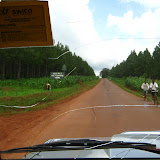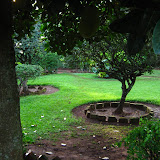Food, revisited.
I've found myself thinking about Ugandan food a lot lately. This will not surprise most of you, since I tend to think about food a lot in general, but seriously, food here is worth thinking about. So, as a refresher to those who weren't paying attention, food in Uganda goes like this:
Dish 1: Starch.
Consisting of any variety of: matoke (boiled green banana pulp), posho (kinda like white polenta, as flavorful as I imagine cloud would be), white rice, boiled sweet potato, boiled cassava, boiled potato, steamed millet.
Sometimes on Side of Dish 1: little bit of collard greens sorta stuff, little bit of cabbage salad.
Dish 2: "Sauce"
Chicken stew, beef (read: gristle) stew, beef (gristle) in g-nut sauce (somehow they make a sauce out of peanuts that doesn't taste like peanut-butter... wierd), fish stew, smoked fish in g-nut sauce, beans in a kinda-stew, "cow-peas" (I think they're garbanzo beans) in a kinda-stew
Now. I realize this sounds like a pretty good variety of options. But A) all of the Dish 1 items are near-flavorless (even the sweet potatoes here are much less sweet than in the States), B) none of the Dish 2 items are flavorful enough to overtake the near-flavorlessness of the Dish 1 items, C) "chili sauce" (I think it's 1 part ketchup, 1 part sweet-and-sour sauce and 1 part generic hot-sauce) is not always available and D) these items are available at EVERY RESTAURANT.
This last point is the one I would like to belabor.
Thinking about it, I have never experienced a culture with such universalized food tastes. I mean... everywhere you go you have the same limited options. And everyone is fine with this! Even salt is rarely available. It's honestly impressive. The food is incredibly mild, and incredibly standard. A lot of restaurants don't even bother with menus (which is good because even when they do have menus they're usually out of half of the items on the menu)... you can pretty much just walk in and say "I'll have matoke and fish" and you can be damn-near certain of what you'll get.
In my (limited) observation, food does not seem to carry as heavy a social weight here as it does in many other places in the world - it serves more as fuel. Along this line, eating is less of a social activity. Ugandans tend to wolf down (a phenomenal amount of) food and return to what they're doing. Of course there are plenty of exceptions to this "rule", but it's noteworthy for how different it is to most other places I've been in the world.
Brazilians, for example, do tend to eat grilled meat about 9 days a week, but the act of grilling is a very social activity - everyone hanging out around a grill and occasionally cutting bits of (very flavorful) meat to pass around.
In Laos, food was veeeery communal. Groups will sit together around a heap of meat and veggies, bowls of spiced sauces and a bit basket of sticky rice. The makeup of this heap varies a decent amount, and everyone just grabs a handful of rice and dips/rolls/sticks it with ingredients and goes to town (I miss Lao food...).
In Vietnam, Pho is damn near omnipresent, but it's hugely flavorful and has about 1.2 million ingredients, which vary depending on the restaurant (or, in my case, the street-stall) serving it.
Just an interesting little way Ugandans are different. Having said all this, I'm actually developing quite a taste for Ugandan food. My standard order is "all food but no posho" with smoked fish in g-nut sauce, cow-peas or beans. And looooooots of chili sauce.
Also, there's a good variety of snack kinda things: french fries, samosas, every shape of fried dough you can imagine, chapati (Indian-style pancakey thingies), pancakey-thingies, peanuts ("ground-nuts"), corn-nuts, roasted corn (consistency of beef jerkey), street-side-grilled ? meat, "rolex" (oh rolex... basically an omelette with cabbage and tomato, rolled in a chapati - tastes as good as you'd imagine and feels like a slab of concrete in the stomach).
Wow I lack the power of succinctness. Okay, just a couple other cultural observations then I'll decide whether to take a bucket-shower or just be dirty and grumpy.
Secondly: Ugandan speech.
A pretty huge proportion of Ugandans speak English. Granted my perception is skewed by the fact that I live in an urban center, but it's pretty impressive. Having said that, they have some interesting speech mannerisms.
Ugandans in general speak very quietly. Someone just pointed out to me the other day that it seems to be a respect/status issue, and as I reflect, I think I agree. The bank managers I met with last week tended to speak louder, and the students I've been speaking with in focus group discussions this week tend to be very quiet. It's actually pretty frustrating in a focus group discussion type of setting... it's difficult enough to hear when you're in a group in an open-air classroom, but when the kids are pretty much whispering (and have an accent that isn't too thick but still a bit unfamiliar), it makes carrying on an active discussion nigh on impossible. I say "what" a lot. Fortunately I just learned the Luganda for "what" (it sounds something like "oranji").
Did you ever have a teacher who would end sentences with "what?" and expect you to fill in the "what"-blank? For instance: "This is the what?" "the clavicle!" "Daniel is what?" "awesome!". Ugandans use this all. the. time. I think it falls somewhere between being a space-filler (akin to Americans' firey passion for "like") and a rhetorical device to ensure the listener is paying attention. But they have taken it too far. I was meeting with a woman the other day who I swear said it every other sentence. I understand if you're lecturing to a group of students and want to make sure they're paying attention, but damnit I KNOW you're gonna end "I want to eat what?" with "lunch" so just say it! And what's more a lot of times people won't actually leave a pause for the person to actually fill the word in, so it becomes "I'm going to what? Poop." as if it were a continuous thought.
Okay, that's enough, Daniel.
I hope you all have a nice what? Day. I miss you what? all. I think I'm going to what? see if the water's back on so I can take a what? shower and what? rinse the what? dirt what? off of what? myself.
Hey by the way, I'm coming home soon! Yeah yeah, I've only been here a couple months, but what can I say? I actually really do miss you all. I haven't hammered out the details yet, but I'll be flying home sometime between December 16th and the 20th and flying back sometime between January 8th and the 10th. Also Dave and I are gonna be in the Bay Area from the 27th to the 1st. Let me know when I can see you all!
And now for some totally irrelevant pictures:

A truck... advertising rice or something... with mediocre singers aboard... oooookayyyy

Jinja Road (I think) from the pedestrian overpass

Nakawa market from above. The dangly things are sneakers.
Almost all the clothing you can find in Uganda is second-hand (ever wonder what Salvation Army does with the clothes they can't sell in their stores?).


And I wonder why the power goes out so frequently...

These creepy suckers are everywhere. At least everywhere that garbage is.

Kosher Jews beware!

Uganda is pretty.

Uganda is still pretty.











































